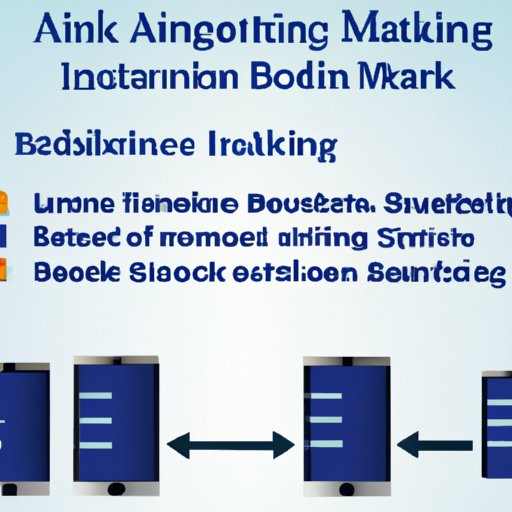Introduction
Investment banking is a highly complex and competitive field that involves a range of activities from providing advice on mergers and acquisitions to underwriting securities. In recent years, automation has been increasingly adopted as a way to streamline and improve processes, reduce costs, and increase accuracy. But what are the implications of automated investment banking for the financial industry and global markets? This article will explore the potential benefits and risks of automating investment banking operations, the impact on the financial industry, the economic implications, and the role of artificial intelligence in the process.
Examining the Benefits and Pitfalls of Automating Investment Banking
Automation can bring significant cost savings to investment banks. By streamlining processes, eliminating manual labor, and reducing the need for human resources, automated investment banking can save time and money. Automation also increases efficiency, allowing banks to quickly process large amounts of data and make decisions faster. Automation also enables more accurate decision making, as machines can analyze data more effectively than humans, reducing the risk of errors.
However, there are potential risks associated with automated investment banking. For example, automated systems may not be able to identify subtle changes in market conditions or regulatory requirements, which could lead to mistakes or missed opportunities. Additionally, automated systems may lack the flexibility to adapt to changing market conditions, potentially leading to losses if the system is unable to adjust quickly enough.

Analyzing the Impact of Automated Investment Banking on the Financial Industry
The introduction of automated investment banking has had a significant impact on the financial industry. One of the most obvious effects is on human resources, as automation has resulted in job losses in some areas. Automation has also changed the way many jobs are performed, requiring employees to have new skills and knowledge. Additionally, the introduction of automated systems has disrupted traditional business models, forcing firms to rethink their strategies and adapt to a changing landscape.
The increasing adoption of automated investment banking has also raised questions about regulatory requirements. As automated systems become more widespread, regulators must consider how to ensure that these systems comply with existing laws and regulations. Additionally, regulators must consider the potential implications of automated systems on market stability, as well as the potential for manipulation of markets by malicious actors.

Assessing the Economic Implications of Automated Investment Banking
Automated investment banking has the potential to have a significant impact on global markets. The increased speed and accuracy of automated systems could lead to more rapid shifts in prices, resulting in greater volatility. Additionally, automated systems could enable more sophisticated investment strategies, such as algorithmic trading, which could further increase market volatility.
Automated systems could also change the way investors manage risk. For example, automated systems could enable investors to quickly identify and respond to changes in market conditions, allowing them to better manage their risk exposure. However, automated systems could also lead to increased systemic risk, as changes in markets could propagate more quickly through interconnected systems.

Investigating the Role of Artificial Intelligence in Investment Banking
Artificial intelligence (AI) has the potential to play an important role in investment banking. AI-enabled systems can analyze large amounts of data, identify patterns, and make predictions more accurately and quickly than humans, enabling more informed decision making. AI systems can also automate complex tasks, such as portfolio optimization, freeing up human resources for other activities.
However, introducing AI into investment banking presents its own challenges. AI systems require vast amounts of data to train and operate, and they can be prone to bias if the data used is incomplete or inaccurate. Additionally, AI systems may be vulnerable to manipulation or exploitation, which could lead to unintended consequences. Finally, AI systems are still largely untested, and their long-term effects on markets and investment strategies remain unknown.
Reviewing the Technological Advances of Automated Investment Banking
The technology behind automated investment banking is rapidly advancing. Automated systems are becoming increasingly sophisticated, capable of performing complex tasks with greater accuracy and speed than ever before. Additionally, advances in artificial intelligence have enabled more powerful decision-making capabilities, allowing automated systems to identify trends and make predictions more effectively.
The adoption of automated solutions has been accelerating in recent years, with many investment banks now using automated systems to process trades, manage portfolios, and analyze markets. However, many banks are still hesitant to fully embrace automation, citing concerns about costs, security, and regulatory compliance. Nonetheless, it is likely that automated investment banking will continue to develop and become more widespread in the coming years.
Conclusion
Automated investment banking has the potential to significantly improve the efficiency and accuracy of investment banking operations, while also reducing costs. However, there are potential risks associated with automation, such as job losses and unintended consequences. Additionally, automated systems could have a significant impact on global markets, with implications for investment strategies and risk management. Finally, artificial intelligence has the potential to revolutionize investment banking, but its long-term effects remain largely unknown. Automation is already playing an increasingly important role in the financial industry, and it is likely that this trend will continue in the future.
(Note: Is this article not meeting your expectations? Do you have knowledge or insights to share? Unlock new opportunities and expand your reach by joining our authors team. Click Registration to join us and share your expertise with our readers.)
